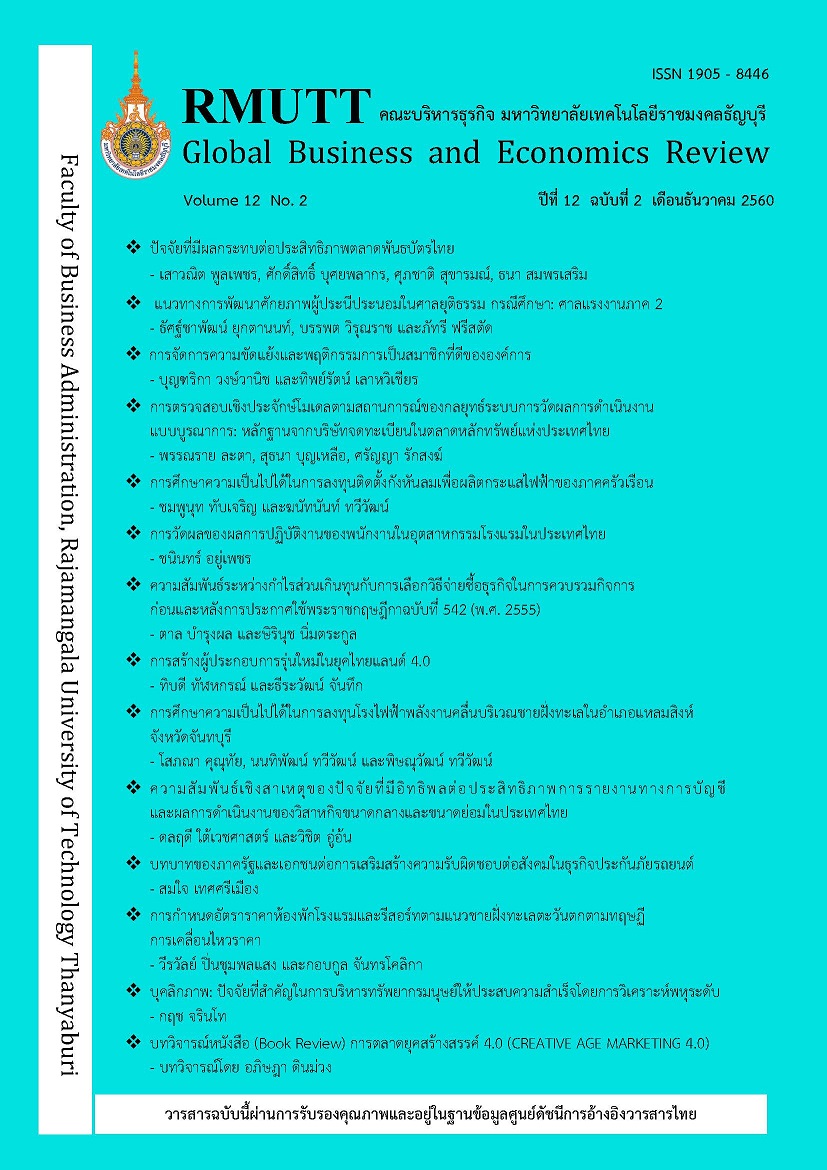CONFLICT MANAGEMENT AND ORANIZATIONAL CITIZENSHIP BEHAVIOR
Keywords:
Organization Citizenship Behavior, Causes of the conflicts, Conflict ManagementAbstract
The study of relationships among organizational citizenship behavior had a main purpose for the future study guide line. This article used literature review method as a tools. Meta-analysis was conducted from academic articles, academic evident, and related literates. The steps taken include 3 part: first concepts of conflict second: concepts of organizational citizenship behavior and third: the analysis of relationships among conflict and organizational citizenship behavior. The result of this study found organizational citizenship behavior consists of five aspects including: altruism, courtesy, conscientiousness, civic virtue and sportsmanship. In the field of conflict found that causes of the conflicts consists of five aspects data conflict, interest conflict, structural conflict, relationship conflict, and value conflict. There were five approaches for organization conflict management which were competition, compromising, accommodation, avoiding and integrating. The literature review found that the causes and methods of conflict management were correlated with organizational citizenship behavior.
References
กุญชรี ค้าขาย. (2555). การศึกษาสมรรถนะการบริหารจัดการของผู้บริหารระดับสูงในองค์กรภาครัฐและภาคเอกชน. กรุงเทพฯ: มหาวิทยาลัยราชภัฎสวนสุนันทา.
กาญจนา สามิภักดิ์ และคณะ. (2551). การนำเสนอแนวทางการบริหารความขัดแย้งภายในองค์การ. (การศึกษาค้นคว้าอิสระปริญญามหาบัณฑิต, มหาวิทยาลัยนเรศวร).
คณิต เรืองขจร. (2557). การบริหารความขัดแย้งในองค์กรที่มีอิทธิพลต่อผลการปฏิบัติงาน กรณีศึกษาบุคลากรคณะบริหารธุรกิจ มหาวิทยาลัยเทคโนโลยีราชมงคลทั้ง 4 แห่ง. (วิทยานิพนธ์ปริญญา มหาบัณฑิต, มหาวิทยาลัยเทคโนโลยีราชมงคลธัญบุรี).
ชญารัศมิ์ ทรัพย์รัตน์ และประพันธ์ ชัยกิจอุราใจ. (2556). พฤติกรรมการเป็นสมาชิกที่ดีขององค์การกับผลลัพธ์ที่เกิดขึ้น. วารสารมหาวิทยาลัยฟาร์อิสเทอร์น, 7(1), 7-22.
ฐานิตย์ เกสร. (2551). ผลกระทบของการทำงานเป็นทีมและการบริหารความขัดแย้งที่มีต่อคุณภาพการสอบบัญชีของสำนักงานตรวจบัญชีสหกรณ์. (วิทยานิพนธ์ปริญญามหาบัณฑิต, มหาวิทยาลัย มหาสารคาม).
พงษ์เทพ จันทสุวรรณ. (2558). The function of The executive Chester I. Barnard. วารสารสมาคม นักวิจัย, 20(2), 172-176.
ยุทธนา จันแก้ว. (2556). การจัดการความขัดแย้งของตำรวจในสถานตำรวจภูธรสีดา อำเภอสีดา จังหวัดนครราชสีมา. (ปริญญาพุทธศาสตรมหาบัณฑิต, มหาวิทยาลัยมหาจุฬาลงกรณราชวิทยาลัย).
วรชัย วิฒสิารกุล. (2551). สาเหตุและแนวทางการบริหารความขัดแย้งในการปฏิบัติราชการขององค์การบริหารส่วนตำบลในเขตอำเภอด่านขุนทด จังหวัดนครราชสีมา. (การศึกษาอิสระปริญญา มหาบัณฑิต, มหาวิทยาลัยขอนแก่น).
วัลลพ ล้อมตะคุ. (2554). ปัจจัยเชิงสาเหตุที่ส่งผลต่อพฤติกรรมการเป็นสมาชิกที่ดีขององค์การของพนักงานสายปฏิบัติการ มหาวิทยาลัยในกำกับของรัฐ. (วิทยานิพนธ์ปริญญามหาบัณฑิต, มหาวิทยาลัยเทคโนโลยีสุรนารี).
สฎายุ ธีระวณิชตระกูล. (2547, มิถุนายน-ตุลาคม). การส่งเสริมพฤติกรรมการเป็นสมาชิกที่ดีต่อองค์การสู่การพัฒนาทรัพยากรมนุษย์ในองค์การอย่างยั่งยืน.วารสารศึกษาศาสตร์, 15-28.
สมิต สัชฌุกร. (2550). การบริหารความขัดแย้ง. สืบค้นจาก http://www.tpa.or.th/writer_this _book_topic.php?passTO=0f479457ee38074ece5d663d98a35853&bookID=653&read =true&count=true
สุนทรี ศักดิ์ศรี และนนทิรัตน์ พัฒนภักดี. (2557). ปัจจัยที่สัมพันธ์กับพฤติกรรรมการเป็นสมาชิกที่ดีในองค์การของบุคลากรสายสนับสนุนวิชาการในมหาวิทยาลัยเทคโนโลยีพระจอมเกล้าพระนครเหนือ มหาวิทยาลัยพระจอมเกล้าธนบุรี และสถาบันพระจอมเกล้าเจ้าคุณทหารลาดกระบัง. วารสารวิชาการศิสปศาสตร์ประยุกต์, (8)2, 2-11.
ศิริวรรณ มนัตระผดุง. (2559). การจัดการความขัดแย้งในองค์การอย่างสร้างสรรค์. วารสารวไลยอลงกรณ์- ปริทัศน์ (มนุษยศาสตร์และสังคมศาสตร์), 6(2), 194-208.
Barnard, C. I. (1938). The Function of Executive. Cambridge, Harvard University Press.
Clegg, S. R., Hardy, C., & Nord, W. R. (1996). Handbook of Organization Studies. London: SAGE.
Coffey, R. E., Cook C. W., & Hunsaker, P. L. (1994). Management and organization behavior. Bur Ridge: Irwin.
DuBrin, J. Andrew. (1998). Leadership research findings practical and skill. Houghton Miffin Company.
George, J. M., & Jones, G. R. (2002). Organizational Behavior (3rd ed.). New Jersey: Prentice – Hall.
Jackson, S. E., Schuler, R. S., & Werner, S. (2009). Management human resources (10thed.). Mason: Southwestren Publishing.
Katz, D. (1964, April). The motivational basis of organizational behavior. Behavioral Science, 9(2), 131-146.
Kreitner, R. & Kinicki, A. (2001). Organizational Behavior (5th ed). Boston: McGraw-Hill.
Moore, C. W. (2014) The mediation process: practical strategies for resolving conflict. (4thed). San Francisco: Jossey-Bass.
Moorhead, G., & Griffin, R. W. (1998). Organizational behavior: managing people and organizations. Boston: Houghton Mifflin.
Organ, D. W. (1987).Organizational citizenship behavior: the good soldier syndrome. Massachusetts: Lexington.
Organ, D. W., & Bateman, T. S. (1991).Organizational Behavior (4th ed.). Homewood: Irwin.
Robbins, S. P., & Coulter, M. (1999). Management (6th ed.). New Jersey: Prentice Hall.
Thomas, K. W., & Kilmann, R. H. (1987). Thomas –Kilmann conflict model interest. New York, NY: X/COM Incoporated.
Van Slyke, E. J. (1999). Listening to conflict: finding constructive solution to workplace disputes. New York: AMACOM.
Wayne, S. J., & Green, S. A. (1993). The effects of leader-member 276 research reports exchange on employee citizenship behavior and impression management behavior. Human Relations, 46, 1431–1440.
Downloads
Published
How to Cite
Issue
Section
License
The articles published in this journal are the intellectual property of their respective authors.
The views and opinions expressed in each article are solely those of the individual authors and do not reflect the positions of Rajamangala University of Technology Thanyaburi or any of its faculty members. All components and content of each article are the sole responsibility of the respective authors. In the event of any errors, the authors shall bear full responsibility for their own work.








